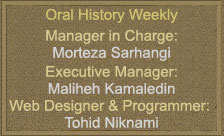| No. 373 | 6 November 2018 |
Importance of Practicing “Asking Questions” for Oral History InterviewsIn the second session of technical training of “Public Culture, Oral History Approach”, Dr. Morteza Nouraee, said: "Exercising asking questions is an important trait in the interviewer, representing competence. When fully versed on the subject, questions might be engineered. Open interviews are preferred in oral history interviews so that we can ask questions at any time. But you should already have a pivotal question.Why do historians hold less meetings?According to Iranian oral history website, the general meeting of Iranian Society of History attended by members of the Society was held in the morning of Mehr 26, 1397(October 18, 2018) in Hekmat Hall of Humanities Research Center. In this program, which was attended by some of the founders of the Society, the development of the Society goals was emphasized with regard to the initial goals of establishment.First Passage of Oral History of Department of Architecture of Shahid Beheshti UniversityAccording to Iranian Oral History Website, project of "Oral History of Department of Architecture and Urban Planning of National University of Iran (Shahid Beheshti)", attended by graduates and professors of architecture of Shahid Beheshti University and executives of this project, and was introduced in Farrokhi Yazdi Hall of Museum of the Qasr Prison on the afternoon, October 18, 2018.Interview with author of biography of a shrines defender martyrWriting Based on Reality and InterviewThe book of biography of a shrines defender martyr named Amin Karimi Chenbaloo titled "Taher Qudsi", was unveiled on the last days of Mehr in 1397 (October 2018) on the occasion of the third anniversary of his martyrdom. According to the Iranian Oral History website, this book is written by Maryam Erfanian Noorozadeh. He has already written books such as "The Fall of ThoseVocational EducationOral History with Public Culture ApproachAccording to the website of Iranian Oral History, the first meeting out of the first course of the vocational education "Oral History with Public Culture Approach" organized by the Center for Isfahanology and the House of Nations was held in the gathering hall of the center on Thursday 18th of October, 2018. Dr. Morteza Nouraee and Dr. Valiollah Mosayebi delivered speeches during the meeting. Oral History Weekly Magazine Aims and Regulations
Oral History Weekly Magazine wishes to create a suitable place for thoughts and idea development; Its main field would be “Oral History” and subjects as telling & writing memoirs, writing diaries, travelogues, chronologies, and all other subfields of history which are presented in the form of news, articles, reports, notes, interviews and memoirs can be included. There is no limitation on the length of would-be-sent materials. Mentioning the name, academic background and email is necessary. Articles with complete references and bibliography are more credited and an abstract would quite helpful. Weekly is not about to publish any material consisting insults and libels about other people or anything that brings anxiety to public opinion. Weekly can edit and translate the received materials. The published articles and materials are only the writer’s ideas and Oral History Weekly Magazine has no responsibility about their content. |
 Memoirs of Marzieh Hadidchi (Dabbagh) (Part 64) Edited by: Mohsen Kazemi Tehran, Sooreh Mehr Publications Company 2002 (Persian Version) Translated by: Zahra Hosseinian Attachment 4 In this meeting the Soviet foreign minister along with delivering Mikhail Gorbachev’s written response to Imam Khomeini informed about its contents. Shevardnadze started: “I am thankful of the great Imam for giving us this time to meet him. I have a mission to deliver the response letter of Mikhail Sergey Gorbachev to Imam. I will try to inform you about its contents briefly. At first I must say the fact of exchanging messages between the two leaders is a unique issue in our relationships. I believe that there is a condition for having a new quality of relationship between the two countries, for cooperating in all issues.    |
